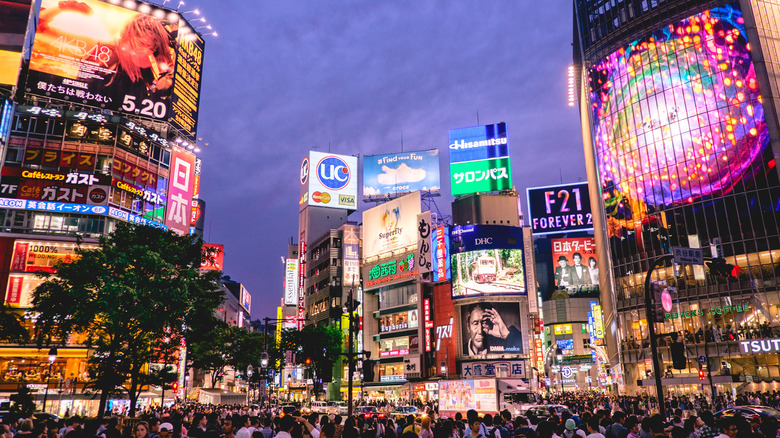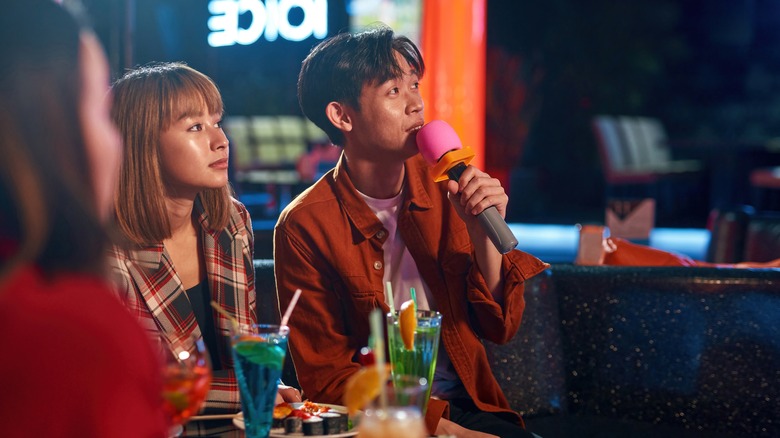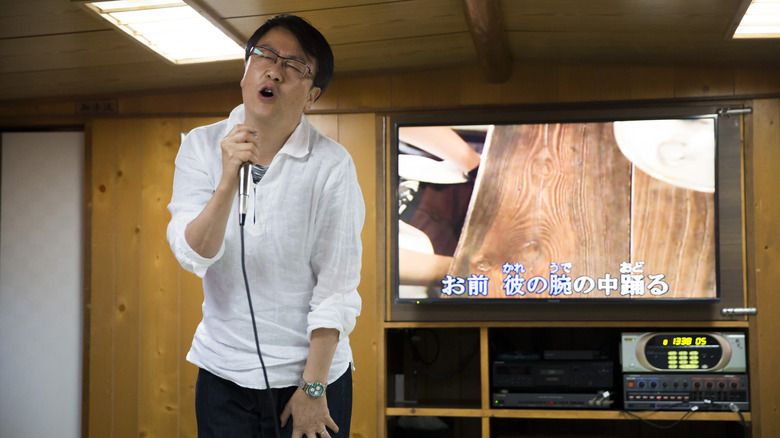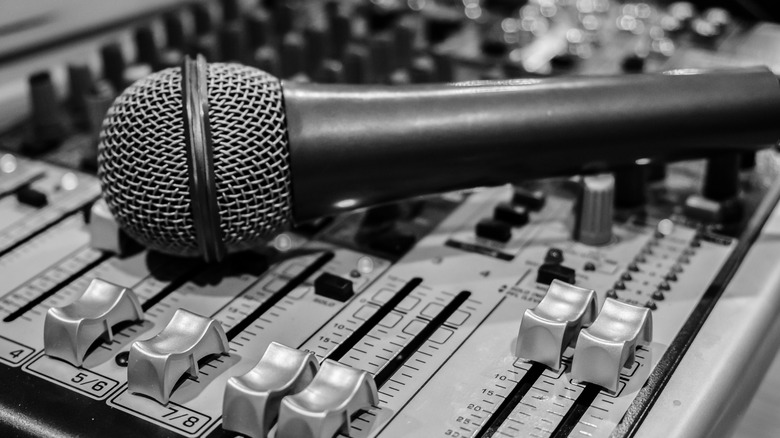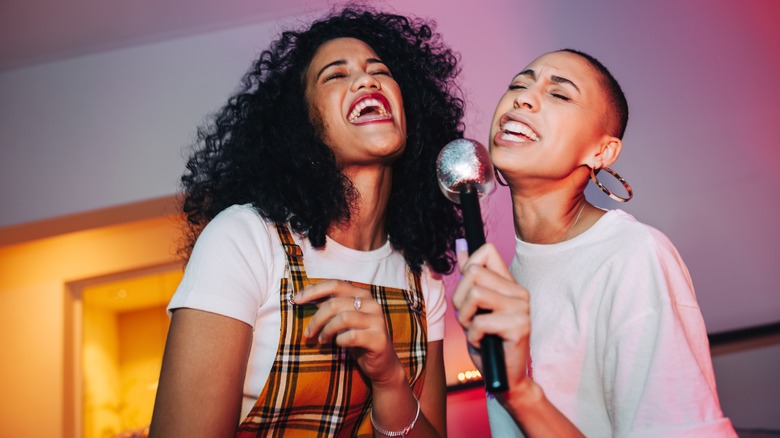Who Invented Karaoke?
Who doesn't like karaoke? Well, maybe people who hate to sing. But, singing is an integral part of the human experience and has been a popular form of entertainment for a long time now. The word karaoke translates to "empty orchestra" in English and is a portmanteau — a combination of two or more words — of the Japanese words "kara" (from "karappo," which means empty) and "oke" (from "okesutura," meaning orchestra). When you put both together, you get karaoke (via Times of India).
According to Statista, sales of karaoke machines have steadily increased over the past decade, with their retail value being $20.34 million in 2020. So, it's easy to see that karaoke remains a favorite pastime for many people around the world, even if it can be quite embarrassing to sing in front of your family and friends.
With that being said, there's some very interesting facts behind how karaoke came to be a household word. So, we're going to go over the history of it all, starting with its inventor, Daisuke Inoue, as Japanology notes.
Karaoke originated in Japan
To start, the karaoke we know was invented and popularized by a Japanese musician named Daisuke Inoue in 1971. There were a few proto versions of karaoke, such as the famed NBC series called "Sing Along with Mitch," which ran from 1961 to 1964, as IMDb says, but this did not have the key trademarks we know and associate with the popular form of entertainment today, such as karaoke machines.
For that, we have to look towards Inoue who popularized karaoke and helped create a modern business model for it by getting nightclubs in Japan to install the machines. One of the biggest contributions that came from Inoue was in making this pastime incredibly accessible to even the most amateur of singers. He added a reverb function to his machines, which helped hide deficiencies in singing, and the songs were in simpler keys to make them easier to sing, according to "Pure Invention: How Japan Made the Modern World."
Karaoke wasn't very popular at first
If you thought that karaoke immediately took off, you'd be wrong, as Daisuke Inoue had a hard time pitching the concept at first. When Inoue first debuted his machines in nightclubs and cabarets, next to nobody used them, according to "Pure Invention: How Japan Made the World". Inoue's initial plan was to lend the machines to bars for free to proliferate use, but this idea proved to not be so hot when they were basically ignored by bar patrons.
After some time, Inoue decided it might be better to get hostesses to sing on the karaoke machines in order to attract would-be bar patrons into trying the machines out. A hostess is like a special kind of Japanese waitress, often a young, attractive woman employed by a hostess bar, who talks to customers, pours them drinks, and sometimes even does karaoke with them (via Japan Info). This worked out in Inoue's favor, as the karaoke machines started to become more popular in hostess bars and nightclubs.
Daisuke Inoue wasn't the only karaoke pioneer
Daisuke Inoue is widely known as the father of karaoke for creating the business model and modern features that all the sing-a-long machines have nowadays, but there was one other before him who patented the idea: Shigeichi Negishi, according to Kotaku. While Negishi did not create the format of karaoke nor popularize it to the massive degree Inoue did, he did do one very important thing: He invented the first-ever karaoke machine.
Negishi invented the Sparko Box in 1967 after coming up with the idea when an engineer employee at his company, Nichiden Kogyo, made fun of his singing. Negishi decided to connect a microphone to his tape deck so he could hear how bad his singing was, then realized he had a potential product on his hands, and thus made a machine out of it called the Sparko Box, as stated by "Pure Invention: How Japan Made the Modern World."
Daisuke Inoue had patent problems
Despite the fact that karaoke became a huge hit, resulting in annual revenue of millions of dollars, the man at the center of it all did not make as much as he could have. Turns out that while Inoue was a genius inventor, his business acumen was sorely lacking. You'd think that getting a patent for your new hot product that would soon take over the world would be a great idea, but Inoue chose not to, losing out on potential millions (via Japanology). He joins the ranks of other famous inventors who also chose to opt-out of patenting their inventions.
That's not to say that Inoue didn't make any money at all. According to The Atlantic, Inoue was able to sell around 25,000 units at $450 each, which means that his business idea was profitable after all. One can only imagine though where his wealth might be had he secured a full patent.
So, who holds the patent for the modern karaoke machine now? It's actually an unexpected source: Roberto del Rosario, a Filipino inventor who developed and patented a Karaoke Sing-Along System all the way back in 1975, as said by the BBC. This is also when karaoke itself exploded in the Philippines, becoming used in Filipino bars and households across the country.
Karaoke today is a worldwide cultural phenomenon
What started off as a small, fun activity in a few Japanese nightclubs bloomed into an international obsession, as said by the BBC. Nowadays, you can find karaoke being enjoyed in many countries and even by a few celebrities like professed mic lovers Will Ferrell and Manny Pacquiao.
In fact, karaoke bars, like the ones found in Asian countries such as Japan and South Korea, have started cropping up all over the place in America, as stated by CGTN. Even car manufacturers like Elon Musk's company Tesla have a "caraoke" feature built in to make long road trips slightly more bearable (via Insider). Adding a "caraoke" feature to Teslas also wouldn't be the weirdest thing Musk has ever done, as his life is filled with crazy incidents. No matter if you're a rockhead or a pop fan, this pastime will be sure to have something to entice you. And, given that humans have the propensity to express themselves through song and dance, it's safe to say that karaoke is going to continue to grow in popularity for a very long time.

